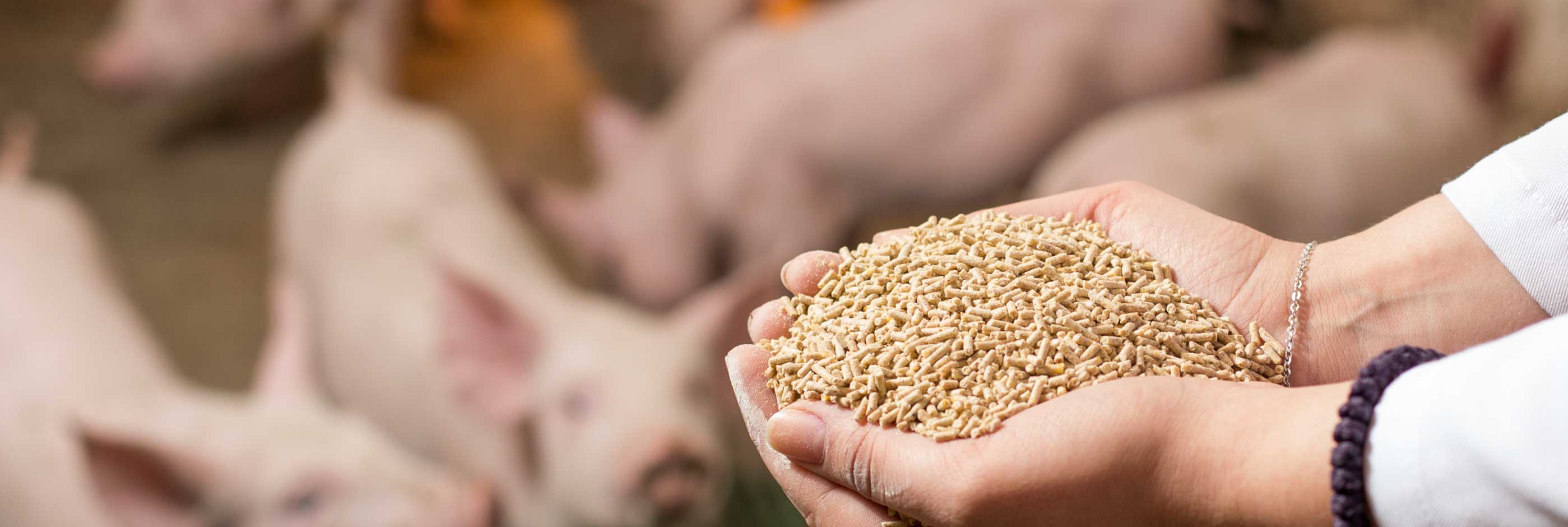Anti-nutritional factors: the dark side of soybean meal
Anti-nutritional factors in soy protein present a risk to young animal growth, health, and welfare. Hamlet Protein aims to minimize the anti-nutritional factors that are most critical to the growth and development of piglets, calves, and chicks.
Is soybean meal really the best protein source for feed?
Soybean meal (SBM) is commonly accepted as the source of plant-based protein that contains all the essential amino acids necessary to maximize animal growth and development. Yet, when ordinary SBM is used in starter feed, young animals have a hard time digesting their diet. Soy’s natural content of anti-nutritional factors (ANFs) is the reason.
In soybeans, ANFs cover a range of substances that provide important protection against mold, bacteria, and over-consumption by wild animals. Therefore, in feed for piglets, calves, and chicks, they represent a health risk. There is a large amount of scientific literature about their harmful effect on the development and functionality of the gut, reducing the utilization of nutrients and, consequently, compromising growth.
The digestive physiology of young animals is not prepared to deal with ANFs
The gastrointestinal tract of young animals is physiologically, microbiologically, and immunologically immature during the first days (chickens), weeks (piglets) or months (calves) of life.
Up to the age of seven to eight weeks, piglet guts lack a fully developed enzymatic system and have limited digestive capacity.
For this reason, piglets are dependent on easily digestible and high-quality protein in their feed to support organ and muscle development (gut health). Diets that fail to meet these nutritional requirements will compromise this development and cause a slowdown in growth that is never recovered. Galacto-oligosaccharides, trypsin inhibitors and antigens are the critical ANFs to reduce in piglet starter feed.
Calf performance is most at risk in the first eight to ten weeks of life, before the transition to ruminant is complete. At this stage, calves are still functional mono-gastrics with few digestive enzymes and, as such, have a limited ability to absorb nutrients in feed. Antigens and trypsin inhibitors are the primary ANFs in soy-based pre-starter feed that create health and performance issues for young calves after weaning.
The influence of soy ANFs on chick health is attracting growing attention. From hatch to approximately 10 and 14 days of age, chicks struggle with trypsin inhibitors and galacto-oligosaccharides, respectively. It is widely demonstrated that high amounts of soybean galacto-oligosaccharides in chicken starter diets lead to on-farm problems related to diarrhea, wet litter, and foot dermatitis. Furthermore, high levels of trypsin inhibitors in starter diets, in addition to reducing protein digestibility and consequently chick growth, can also lead to proliferation of populations of pathogenic bacteria in the intestine.
How does each of these ANFs harm young animals?
Trypsin inhibitors restrict the digestibility of protein, which then passes unabsorbed into the large intestine without contributing to animal growth. The undigested protein is fermented by bacteria, including potential pathogens, which produce toxic end-products that impair the integrity and functions of the intestinal membrane. Toxins absorbed from the gut activate the immune system, which requires energy to combat the toxins. In this way, there is less energy available for growth, resulting in lower performance. In addition, the fermentation of undigested protein by putrefactive bacteria produces many harmful and toxic compounds, which in high concentrations may have further adverse effects on animal growth and performance.
The protein fermentation products include amines, indoles, phenols, cresol, and ammonia, which can all negatively affect host or cell health.
Galacto-oligosaccharides are relevant ANFs in both piglet and chick diets. They cannot be digested by mammals or birds. Therefore, they travel undigested through the gastrointestinal tract, being only partially fermented by the immature microbiota in the large intestine and caeca (chicks). Non-fermented oligosaccharides have an osmotic effect that releases water from the gut lining, contributing to a fast gut transit time and diarrhea. On the other hand, gas produced by the fermentation process may cause flatulence.
The antigen beta-conglycinin has proven to be very harmful to piglets and calves. It is now also believed to be a possible health issue in chicks. In general, it has a negative impact on the gut membrane, causing inflammatory lesions and compromising the gut’s ability to absorb nutrients.
Negative effects include increased mucus production, intestinal villi atrophy and cellular apoptosis. Another consequence of a compromised, more permeable gut is that large and potentially harmful molecules can pass the gut lining and cause an allergic reaction. The subsequent activation of the immune system draws on energy and nutrients, reducing the resources available to support animal growth.
Targeted ANF reduction at Hamlet Protein
Our patented process is fine-tuned to minimize the ANFs critical to young animal health.
Heat treatment by toasting, extrusion or steaming is widely used by the soy processing industry, but there are disadvantages when excessive heat is applied. Protein denaturation results in loss of nutritional value, and the Maillard reaction – when reducing sugars and amino acids form irreversible complex bindings – leads to a further reduction in amino acid utilization.
Although it is possible to avoid such problems by applying a moderate heat treatment of maximum 110°C for 30 minutes, this is not sufficient to inactivate all ANFs. Additional advanced enzymatic treatment is necessary to reduce ANFs to a tolerable level so young animals can digest the soy proteins in their feed and gain full nutritional benefit, avoiding potential health issues.
At Hamlet Protein, we have identified the ANFs that are least tolerated by piglets, calves, and chicks which are also most critical to their health and development. Our process is designed to inactivate these ANFs gently and effectively to optimize the availability of the essential amino acids in our specialty soy proteins.
What are ANF's?
In soybeans, ANFs cover a range of substances that provide important protection against mold, bacteria and over-consumption by wild animals. However in feed, they represent a health risk.
Many scientific studies have documented their harmful effect on the development and functionality of the gut, reducing the utilization of nutrients and compromising growth.
But it is possible to minimize the factors that are most critical to the growth and development of piglets - the result being a high-quality soy protein and improved animal health.
Sequence contains no elements


